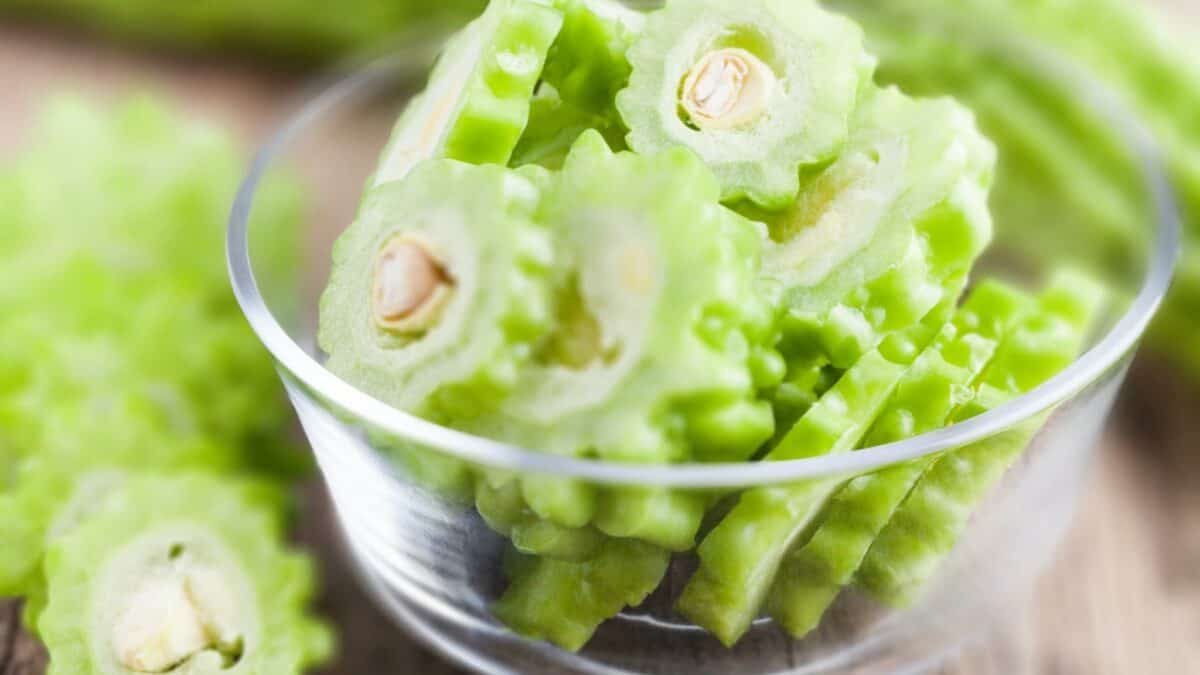Bitter Melon Or Bitter Gourd: Some Know It As Ampalaya
Momordica charantia, known as bitter melon, bitter gourd, bitter squash or balsam-pear in English, has many other local names.
Goya from Okinawan and karela from Sanskrit are also used by English-language speakers.
It is a tropical and subtropical vine of the family Cucurbitaceae, widely grown in Asia, Africa, and the Caribbean for its edible fruit, which is extremely bitter.

Its many varieties differ substantially in the shape and bitterness of the fruit. Bitter melon originated on the Indian subcontinent, and was introduced into China in the 14th century.

Check out our new cookbook
Bitemybun's family recipes with complete meal planner and recipe guide.
Try it out for free with Kindle Unlimited:
Read for freeIn this post we'll cover:
What does bitter melon taste like?
Bitter melon has a unique taste that is often described as being similar to a cross between cucumber and squash. The flesh of the fruit is firm and crunchy, with a slightly bitter flavor. The skin of the fruit is also edible, although it is typically quite bitter. Bitter melon is commonly used in Asian cuisine, and is often stir-fried or used in soups and stews. It can also be pickled or made into juice.
Larger gourds are less bitter than smaller ones.
The bitterness in bitter melon is caused by a group of compounds called cucurbitacins. These compounds are also responsible for the bitter taste of other vegetables, such as cabbage and Brussels sprouts. Cucurbitacins are thought to have a protective role in plants, deterring animals from eating them.
In small amounts, cucurbitacins may actually have health benefits, but consuming large amounts can be toxic.
There are a few ways to make bitter melon less bitter. One method is to soak the fruit in salt water for 30 minutes before cooking. This helps to remove some of the cucurbitacins from the skin. Another option is to cook the fruit with other ingredients, such as tomatoes or onions, which can help balance the bitterness.
Finally, adding a bit of sweetness, such as honey or sugar, can also help to offset the bitterness.
Can I soak bitter melon overnight?
Soaking bitter melon in salt water overnight is a common method for making the fruit less bitter. This helps to remove some of the cucurbitacins from the skin, making it more palatable. Just 10 minutes will already have an effect, but soaking it overnight will greatly reduce the bitterness.
When shopping for bitter melon, look for fruits that are firm and free of blemishes. Avoid fruits that are soft or have brown spots. If the fruit is ripe, it will have a reddish-orange color.
bitter melon can be stored in the refrigerator for up to a week.
How to cook bitter melon
Bitter melon can be cooked in many different ways. It is commonly stir-fried, made into soup, or used in stews.
To stir-fry bitter melon:
1. Cut the fruit in half lengthwise and remove the seeds.
2. Slice the fruit into thin strips.
3. Heat a wok or frying pan over high heat and add oil.
4. Add the bitter melon strips to the pan and stir-fry for 3-5 minutes until they are tender.
5. Serve with rice or noodles.
What does bitter melon go well with?
Bitter melon goes well with pork, beef, chicken, and fish. It can also be used in vegan and vegetarian dishes. Try pairing it with rice, noodles, or other vegetables.
Types of bitter melon
There are many different types of bitter melon, including:
- Chinese bitter melon (Korean melon, foo gwa)
- Indian bitter gourd (karela)
- Bitter squash (balsam pear, balsamino)
- Ampalaya
Is bitter melon healthy?
Bitter melon is a good source of vitamins A, C, and B6. It also contains potassium, magnesium, and fiber. Bitter melon has been used for centuries in traditional medicine to treat a variety of ailments. Today, it is being studied for its potential anti-cancer properties.
Can you eat bitter melon while pregnant?
Although bitter melon contains many nutrients that are good for health, it also carries some risks. It can cause allergies and digestive disorders and may increase the risk of miscarriage or premature birth. For this reason, it is best to avoid eating bitter melon during pregnancy.
Conclusion
So there you have it! Everything you need to know about bitter melon. Give it a try in your next dish and see for yourself why this unique fruit is so popular in Asian cuisine.
Check out our new cookbook
Bitemybun's family recipes with complete meal planner and recipe guide.
Try it out for free with Kindle Unlimited:
Read for freeJoost Nusselder, the founder of Bite My Bun is a content marketer, dad and loves trying out new food with Japanese food at the heart of his passion, and together with his team he's been creating in-depth blog articles since 2016 to help loyal readers with recipes and cooking tips.
